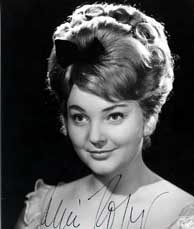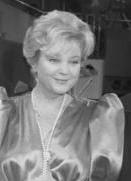Lucia Popp facts for kids
Quick facts for kids
Lucia Popp
|
|
|---|---|

Lucia Popp at 26, playing Blonde in Mozart's Die Entführung aus dem Serail
|
|
| Born |
Lucia Poppová
12 November 1939 Záhorská Ves, Slovak State
|
| Died | 16 November 1993 (aged 54) Munich, Germany
|
| Alma mater | Academy of Performing Arts in Bratislava |
| Occupation | Soprano singer |
| Years active | 1962–1993 |
| Organisation | Vienna State Opera Cologne Opera |
| Title | Kammersängerin |
| Spouse(s) |
Peter Seiffert
(m. 1986) |
Lucia Popp (born Lucia Poppová; 12 November 1939 – 16 November 1993) was a famous Slovak opera singer. She was a soprano, which means she sang with a high voice. Lucia Popp started her career singing light, playful roles. Later, she moved on to more dramatic and powerful parts in operas by composers like Richard Strauss and Richard Wagner. She performed in some of the world's most famous opera houses, including the Vienna State Opera, the Metropolitan Opera in New York, and La Scala in Milan. She was also known for her beautiful performances of classical songs called lieder.
Contents
Life and Career of a Star Singer
Lucia Poppová was born in a place called Záhorská Ves in what was then the Slovak State. This area is now part of Slovakia. Her mother was also a soprano singer, and they often sang together at home. Her father was an engineer who worked for the British embassy for a time.
From Medicine to Music
Lucia first started studying medicine at Bratislava University. But then, she decided to go to the Academy of Performing Arts in Bratislava to study drama. It was there that her amazing singing talent was discovered. She was given a role in a play called Le Bourgeois gentilhomme, which required her to sing.
She began her singing lessons as a mezzo-soprano, which is a slightly lower female voice. However, her voice developed a very high range. Because of this, at just 23 years old, she made her professional debut as the Queen of the Night in Mozart's opera The Magic Flute. She even recorded this role in 1963.
Performing on the World Stage
In 1963, a famous conductor named Herbert von Karajan invited Lucia to join the Vienna State Opera. She first performed there as Barbarina in Mozart's The Marriage of Figaro. Lucia Popp had a very special connection to the Vienna State Opera throughout her career. In 1979, she was given the special title of Austrian Kammersängerin, which means "Chamber Singer" and is a great honor for an opera singer.
She made her debut at the Royal Opera House in London in 1966. Her first performance at the Metropolitan Opera in New York was in 1967, again as the Queen of the Night. The stage design for this show was created by the famous artist Marc Chagall.
Changing Roles and Growing Voice
As Lucia Popp got older, her voice naturally changed and became richer. In the 1970s, she started singing more lyrical roles, which are less about very high notes and more about smooth, flowing melodies. By the 1980s, her voice had matured even more. She began taking on bigger, more challenging roles.
For example, she sang the Countess in Mozart's The Marriage of Figaro and the main role in Strauss's Arabella. She also performed as Adina in L'elisir d'amore and the Marschallin in Der Rosenkavalier. Because her voice changed over time, Lucia Popp sometimes sang different roles in the same opera at different points in her career. For instance, in The Magic Flute, she sang both the Queen of the Night and Pamina.
Film Appearances
Lucia Popp also appeared in a few films. In 1963, she played "Tereza" in the Slovak film Jánošík I., II., which was about a Slovak highwayman named Juraj Jánošík. She also played "Anna Page" in the 1965 film version of Merry Wives of Windsor, based on music by Otto Nicolai.
Personal Life and Legacy
Lucia Popp was married three times. Her first husband was the Hungarian pianist and conductor György Fischer. Later, she married Peter Jonas, who worked as an artistic administrator for the Chicago Symphony Orchestra. Her last husband was the German tenor (a male singer with a high voice) Peter Seiffert, whom she married in 1986.
Lucia Popp sadly died from brain cancer in 1993 in Munich, Germany. She was 54 years old. She was buried in Cintorín Slávičie údolie in Bratislava, Slovakia.
Even after her death, Lucia Popp is remembered as one of the greatest sopranos. In 2007, BBC Music magazine listed her as the seventh best soprano of all time. In 2017, a statue of her was placed in the Vienna State Opera to honor her contributions.
Recordings
Lucia Popp made many recordings of her opera performances and songs. She usually only recorded roles that she had performed on stage. Here are some of her famous recordings:
- Mozart: The Marriage of Figaro (as Susanna), with Te Kanawa, von Stade, Allen, Ramey, Moll, and Solti (Decca)
- Mozart: The Marriage of Figaro (as Countess Almaviva), with van Dam, Hendricks, Raimondi, Baltsa, and Marriner (Philips)
- Mozart: Don Giovanni (as Zerlina), with Weikl, Bacquier, Sass, M. Price, Burrows, Solti (Decca)
- Mozart: The Magic Flute (as Queen of the Night), with Janowitz, Berry, Gedda, Frick, and Klemperer (EMI)
- Mozart: Così fan tutte (as Despina), New Philhamornia and Otto Klemperer, 1971 (EMI)
- Mozart: The Magic Flute (as Pamina), with Jerusalem, Brendel, Zednik, Gruberova and Haitink (EMI)
- Mozart: Idomeneo (as Ilia), with Pavarotti, Baltsa, Nucci, Gruberova, and Pritchard (Decca)
- Mozart: Die Entführung aus dem Serail (as Blonde), with Gedda, Rothenberger, Frick, Unger, and Krips (EMI)
- Mozart: La clemenza di Tito (as Vitellia for Harnoncourt, Teldec; and Servilia for Kertész (Decca) and Davis (Philips)
- Mozart: Il sogno di Scipione (as Costanza), with Gruberová, Schreier, Mathis and Hager (Decca)
- Orff: Carmina Burana with Unger, Wolansky, Noble, and Rafael Frühbeck de Burgos (EMI)
- R. Strauss: Intermezzo (as Christine), with Dallapozza, Fischer-Dieskau, Finke and Sawallisch (EMI)
- R. Strauss: Der Rosenkavalier (as Sophie), with Domingo, Ludwig, G. Jones, Berry and Bernstein (Sony)
- R. Strauss: Daphne (as Daphne), with Goldberg, Schreier, Wenkel, Moll and Haitink (EMI)
- R. Strauss: Four Last Songs, with Klaus Tennstedt conducting the London Philharmonic (EMI)
- J. Strauss II: Die Fledermaus (as Adele), with Várady, Weikl, Kollo, Prey and C. Kleiber (DG)
- J. Strauss II: Die Fledermaus (as Rosalinde), with Lind, Baltsa, Seiffert, Brendel, Rydl and Domingo (EMI)
- Beethoven: Fidelio (as Marzelline), with Janowitz, Kollo, Sotin, Fischer-Dieskau, Jungwirth and Bernstein (DG)
- Humperdinck: Hansel and Gretel (as Gretel), with Anny Schlemm, Brigitte Fassbaender, Gruberová, Hamari, Burrowes, Berry and Solti (Decca)
- Humperdinck: Hansel and Gretel (as the Dew Fairy), with Moffo, Donath, Ludwig, Fischer-Dieskau, Berthold, Auger and Eichhorn (RCA)
- Gluck: Orfeo ed Euridice (as Euridice), with Lipovsek, Kaufmann, and Hager (RCA)
- Verdi: Rigoletto (as Gilda), with Weikl, Aragall, and Gardelli (RCA)
- Leoncavallo: Pagliacci (as Nedda), with Atlantow, Weikl, and Münchner Rundfunkorchester conducted by Lamberto Gardelli (RCA)
- Leoncavallo: La bohème (as Mimi), with Bonisolli, Weikl, Titus, Miltcheva, and Wallberg (Orfeo)
- Puccini: Suor Angelica (as Angelica), with Lipovsek, Marga Schiml, and Patané (RCA)
- Puccini: La bohème (as Mimì), with Francisco Araiza, Barbara Daniels, Wolfgang Brendel, and Münchner Rundfunkorchester conducted by Stefan Soltesz (EMI) (sung in German)
- Donizetti: L'elisir d'amore (as Adina), with Dvorsky, Weikl, Nesterenko, and Wallberg (RCA)
- Donizetti: Don Pasquale (as Norina), with Araiza, Weikl, Nesterenko, and Wallberg (RCA)
- Flotow: Martha (title role), with Jerusalem, Soffel, Ridderbusch, Nimsgern, and Wallberg (RCA)
- Janáček: The Cunning Little Vixen (as the Vixen), with Randová, Jedlicka, Blachut and Mackerras (Decca)
- Janáček: Jenůfa (as Karolka), with Söderström, Dvorsky, Randova, Ochman, and Mackerras (Decca)
- Lehár: Der Graf von Luxemburg (as Angèle), with Gedda, Böhme, Holm, and Mattes (EMI).
- Wagner: Tannhäuser (as Elisabeth), with König, Moll, W. Meier, and Haitink (EMI).
- Bizet: Djamileh (as Djamileh), with Bonisolli, Lafont, Pineau, and Gardelli (Orfeo)
Video Recordings
Lucia Popp also appeared in several video recordings of her performances. You can see her as Pamina in The Magic Flute, recorded live in 1983. She also played Marie in Smetana's The Bartered Bride (1982) and Rosalinda in Die Fledermaus.
She was the female lead in the "Court of Love" section of Orff's Carmina Burana, recorded in 1975. She also appeared as Marzelline in Beethoven's Fidelio with Gundula Janowitz. In 1979, she was Sophie in Richard Strauss' Der Rosenkavalier. There is also a recording of her singing Strauss' Four Last Songs with the Chicago Symphony. In 1993, she was the soprano soloist in Antonín Dvořák's Requiem.
See also
 In Spanish: Lucia Popp para niños
In Spanish: Lucia Popp para niños


